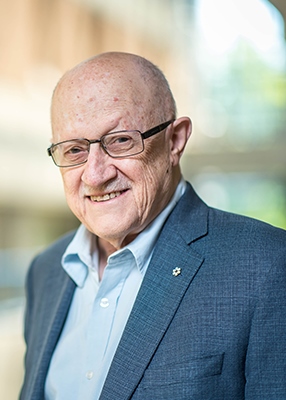In the mythos of Ch’ien-lung, a Dragon is creative and resilient. They represent an integration of masculine and feminine, hard and soft, qualities. The Dragon energy has a level of confidence, a certainty of their skills grounded in reality.
I have been asking myself lately, who do I know who is a Dragon? Who would point to and say this person is an example to strive for.
One person popped up on my radar recently: Dr. Peter Suedfeld, Professor Emeritus at the University of British Columbia. He was recently awarded the Order of Canada, one of the highest civilian honors in Canada, for his lifetime of research.
His work has included studying why certain holocaust survivors who met the stresses of their captivity with meaning and hope went on to thrive in life afterwards. It’s not far off the mark to say that he was studying himself as he studied these survivors. He exudes the same kind of upbeat resilience as they do. In his approach with people, it is as if he was looking for and looking to nourish that resilience in whomever he is with.
He studied the effects of extreme environments such as long duration missions at the poles and in space, pioneering a form of therapy called Restricted Environmental Stimulation Therapy (REST) that makes flotation tanks look like carnivals. It was only that he studied how other people responded in those environments, but the fact that he subjected himself to those conditions as well, immersing himself in month-long nights, allowing the that intense solitude and quiet to work upon and calm his spirit in profound ways.
He has also studied the decision-making of political and military leaders in times of crisis, by monitoring the cognitive complexity of their thoughts on a seven-point scale (under stress, like knowing you are lying, your statements become more simple). Any scientist can tell you, that to pull off this kind of research requires an exceptional level of nuanced thought, as well as a clear sense of observation and deft application of concepts.
I knew him as an undergraduate student, and I can draw a straight line from that to the postdoc I did at NASA aims some 4-5 years later. He had a gift for mentoring.
He once spoke at a party in his honor about how he had become the chair of the department. One interviewing professor, digging to find if he cared about the people at UBC as much as the position of Chair, asked him, “Will you stay after you fulfill your promises as Chair?” to which he responded, “As long as I do the job, what do you care?” The unabashed confidence got him the job, and the line made the whole room laugh.
Dragons come in all shapes and sizes, and there are as many variations as there are people who delve that far in growing their talent and their spirits, but that fundamental hallmark — creativity, resilience and pushing the boundaries of limiting beliefs — Peter Suedfeld’s got it in spades.
